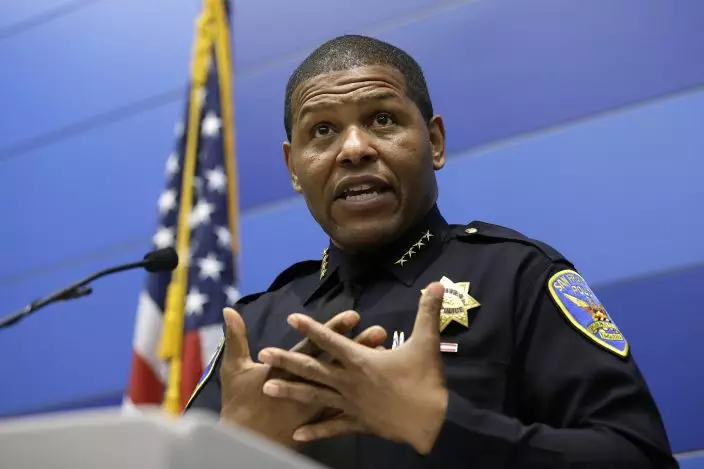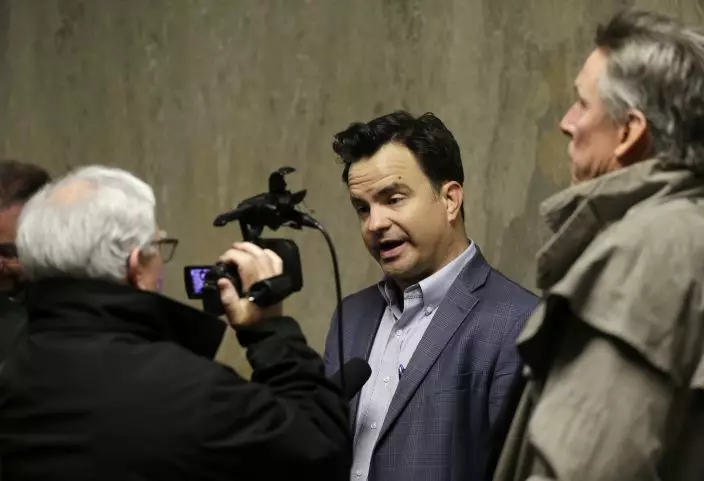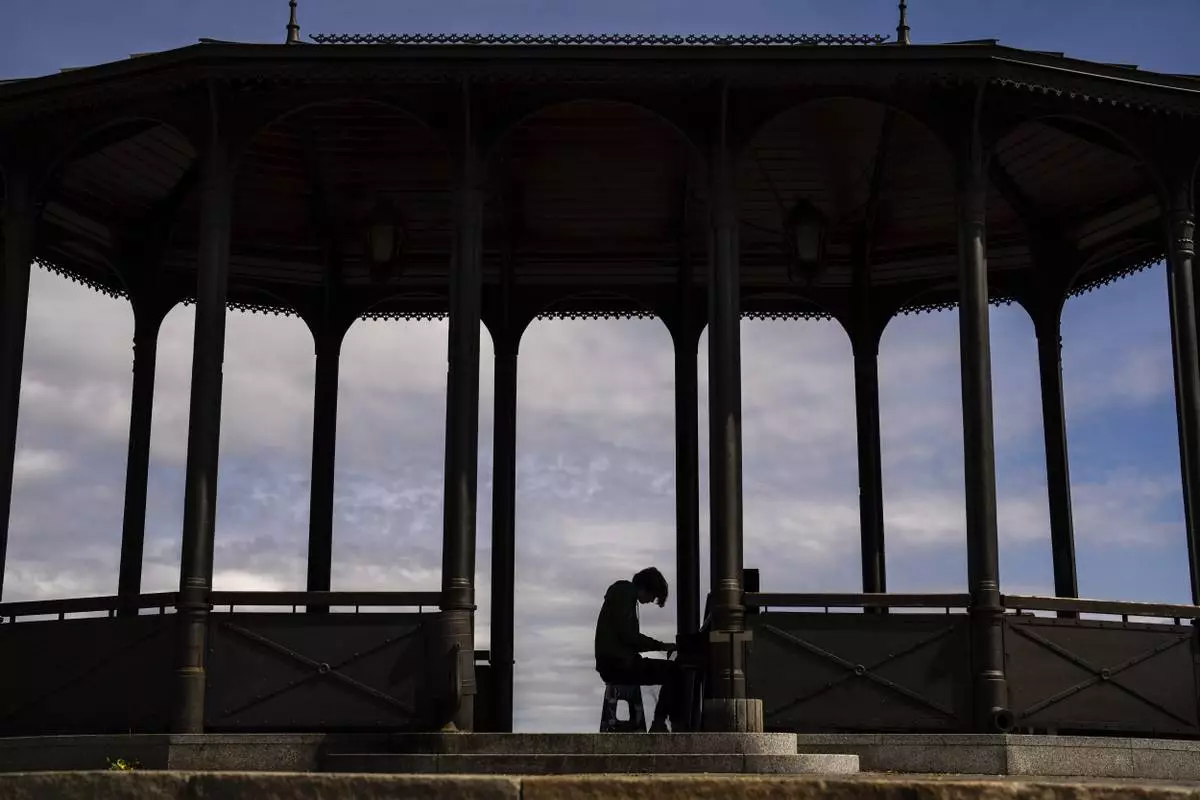Media law experts pushed back against the San Francisco police chief, who said a freelance journalist allegedly conspired to steal a police report, saying that it is not a crime to disclose a public record.
San Francisco attorney Duffy Carolan, who represents several media organizations siding with the independent reporter, said the public has constitutional rights to public records.
"The impact of trying to criminalize disclosure of public records, whether or not it violated internal policy or practice, will have a profound effect on public employees' willingness to disclose public records," she said. "It would have a chilling effect."

San Francisco Police Chief William Scott answers questions during a news conference, Tuesday, May 21, 2019, in San Francisco. Police agreed Tuesday to return property seized from a San Francisco journalist in a raid, but the decision did little to ease tensions in the case, which has alarmed journalism advocates and put pressure on city leaders. Authorities have said the May 10 raids on freelancer Bryan Carmody's home and office were part of an investigation into what police called the illegal leak of a report on the death of former Public Defender Jeff Adachi, who died unexpectedly in February. (AP PhotoEric Risberg)
A battle between the press and police is playing out in politically liberal San Francisco after police raided the home and office of Bryan Carmody earlier this month in an effort to uncover the source of a leaked police report into the unexpected death of the city's former elected public defender.
A journalist who actively and meaningfully participated in unlawfully acquiring information could be successfully prosecuted for a crime, said David Snyder, executive director of the First Amendment Coalition. Hypothetical examples include a reporter providing passwords or hacking instructions to allow someone on the inside to unlawfully access a database.
But Snyder emphasized that a police report is "not a confidential, legally protected document" and its disclosure and publication is lawful.

Thomas Burke, attorney for freelance journalist Bryan Carmody, followed by David Snyder, First Amendment Coalition Executive Director, make their way into a courtroom Tuesday, May 21, 2019, in San Francisco. A San Francisco police attorney said that Carmody, whose office and work equipment was seized in a police raid, can collect his property although the legal issues surrounding the case were not resolved Tuesday. San Francisco Superior Court Judge Samuel Feng set dates to hear separate motions to quash search warrants used to raid the home of Carmody and to unseal those warrants. (AP PhotoEric Risberg)
San Francisco Sgt. Michael Andraychak said Wednesday that the report was not a public record and that state law protects crime reports when "disclosure would endanger the successful completion of the investigation or a related investigation."
But media experts said although the law allows police to keep reports secret, it does not require police to do so and it is perfectly lawful to release the information. Police also did not raid the office of a reporter for the San Francisco Chronicle who obtained the same report independently of Carmody. The newspaper has said it did not pay for the report.
Police used a sledgehammer to try to get into Carmody's home and office and cuffed him for hours as they searched and subsequently removed dozens of cameras, cellphones, computers and other equipment used to gather news.

David Snyder, First Amendment Coalition Executive Director, answers questions outside a courtroom Tuesday, May 21, 2019, in San Francisco. A San Francisco police attorney said that a reporter whose office and work equipment was seized in a police raid can collect his property although the legal issues surrounding the case were not resolved Tuesday. San Francisco Superior Court Judge Samuel Feng set dates to hear separate motions to quash search warrants used to raid the home of freelance journalist Bryan Carmody and to unseal those warrants. Media organizations are outraged that police raided a journalist's home. (AP PhotoEric Risberg)
San Francisco Police Chief William Scott acknowledged at a press conference Tuesday that the raids looked bad. It was his first full remarks more than week after the May 10 raids.
"We believe that that contact and that interaction went across the line," Scott said Tuesday, referring to Carmody's efforts to acquire the report. "It went past just doing your job as a journalist."
Reporters and other First Amendment organizations are asking a San Francisco judge to revoke search warrants that authorized the raids and to unseal the materials submitted in support of them. Because the warrants are under seal, it's not known what information police provided to support the search warrants, or whether they disclosed to the judges that Carmody is a journalist.
Carmody said he passively received the report from a source and that he did not pay for the report — though doing so would not have been a crime, the experts said. Still, Scott said the journalist "crossed the line," motivated by profit or animosity toward the late public defender, Jeff Adachi. An autopsy found Adachi died Feb. 22 of a mixture of cocaine and alcohol, compromising an already bad heart.
The U.S. Supreme Court has ruled that journalists are free to report on newsworthy information contained in stolen documents or illegally intercepted telephone communications obtained from a third party who violated the law, said Carolan, the attorney.
The court may have ruled differently had the journalists encouraged or aided in the unlawful interception of the call, she said. But that has nothing to do with a reporter who encourages a public official or public employee to provide a public record.
"That is what reporters do every day," Carolan said.
Snyder, of the First Amendment Coalition, said the police chief's comments suggest the police employee may have accessed an unauthorized system to obtain the report.
"Would an offer by the journalist to pay the source to break the law be enough? Maybe. It would depend on the circumstances," he said.
"I don't think it matters what Carmody's motivations were. The question is: Was his conduct protected by the First Amendment? And all the facts I've seen thus far show it was," he said.
Scott has not provided details of the investigation other than to say that Carmody was an active participant in acquiring a police record, which the reporter then sold to three television news outlets as part of a news package that included information obtained from interviews and video footage from the scene of Adachi's death.
Carmody has not responded to requests for comment, although he posted on Twitter on Wednesday the hashtag #journalismisnotacrime. A GoFundMe campaign has raised more than $15,000 for the veteran reporter to replace his equipment.
California's shield law specifically protects journalists from search warrants. The Associated Press is among dozens of news organizations siding with Carmody and seeking to submit a friend-of-the-court brief.










